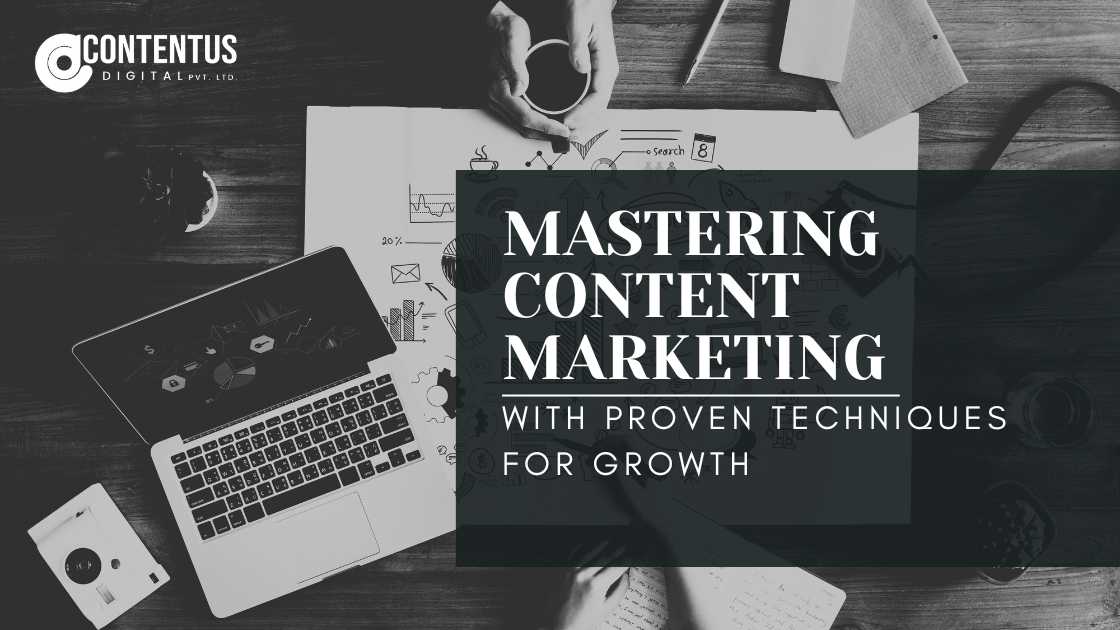Blog Details

9 December
Mastering content marketing with Proven Techniques for Growth
In today’s competitive business world, content marketing becomes a powerful strategy to develop your online presence and engage with the target audience. By crafting valuable and relevant content, you can attract your target audience. So, you might want to master the content marketing strategy. However, mastering content marketing is not an easy task. It takes time and hard work to make it work. Along with that, managing communication channels and consistent optimisation of content is necessary to make strategies work. But this is not all; there is a lot more to do in terms of content marketing, so read on. The proven techniques for mastering content marketing Here, we have discussed some strategies that will help you master the art of content marketing – Create a brand story Storytelling is a powerful technique to captivate audiences, establish strong connections, and build brand value. For example, you should showcase how your products or services can solve the customers’ requirements, how they become helpful in solving customers’ major issues, and what their approaches toward customers’ pain points. Moreover, defining your USPs (Unique Selling Points) makes you stay on top of the market. Set a clear goal First, clearly define your content marketing goals, which are measurable, such as – increasing web traffic, improving click-through rates, conversion rates, sales rates, or increasing followers. Then, integrate these goals with your business strategy. So, try to focus on content themes, distribution channels, and messaging. But, ensure your content marketing goals are aligned well with your business goals. Define your target audience Your content cannot bring the right output without the correct audience. So, it’s important to know what your audience is expecting from you. You can collect demographic data of the visitors to clearly understand their requirements. Also, web analytics, email subscriber analytics, and social media analytics provide you with their age, education, income, and gender. Additionally, a tool like Google Analytics helps you to dive into their key interest. Moreover, you can take advantage of customer feedback by using real-time polls, instant notifications, smart survey fields, survey reports, and more. People are more likely to be attracted by visual elements in content like videos, images, graphs, and charts rather than just plain text. The reason is that visual elements can create a long-lasting impression on your customers. Whether you’re promoting a product, sharing a story, or an online course, visual elements convey your messages better than the texts. The colours of images and videos are vibrant, eye-catching and appealing, which brings a new dynamic to your content marketing strategy. Creating SEO-friendly content Understanding the basic concept of SEO is a crucial important factor in mastering content marketing. You should conduct in-depth keyword research and use them strategically to reap its benefits. Also, ensure you use proper metadata and structure for content. These techniques help to fit your content with the relevant search terms from your target audience. But don’t compromise the quality of content by prioritising SEO. So, avoid unnecessary keyword stuffing and focus on an engaging, informative, and readable content. Effective content distribution strategy After content creation, you should distribute them properly. Unless you distribute and share them, you won’t get the desired result. So, first identify the platforms (like Facebook, Instagram, Twitter, etc.) where your audience visits frequently. Then, leverage your content sharing according to the best practices of each platform. These practices include engaging in conversations, responding to comments and messages, using relevant hashtags, and sharing user-generated conversations. Content calendar Scheduling your content-releasing activities helps you to avoid chaos at the last moment. So, it’s important to use a content calendar to prioritise your content according to the date of release. You can use Google Calendar to set the target date for content. This strategy keeps you consistent and productive and keeps your audience engaging. Email marketing and newsletters Use email marketing and newsletters to distribute your content to your subscribers. So, create eye-catching subject lines for each email and visually appealing elements to grab the attention of your audience. Moreover, personalise your emails and newsletters regularly so that your content remains aligned with the subscribers’ interests. Again, use proper call-to-action to show your transparency towards users. Mobile Optimisation In recent years, more and more people are leaning towards smartphones and tablets for their content consumption. Studies have shown that most of the internet traffic comes from mobile devices. These devices are portable and lightweight. So, you can read, watch or listen to your desired content anytime and anywhere. For this flexibility, content marketers must adopt a mobile optimisation approach in their content marketing. By adopting a mobile-friendly approach, businesses can improve user experience, organic traffic, search engine ranking, and sales and attract more customers. Content localisation The idea of content marketing becomes impactful when you’re planning to promote your content for a specific region, locality, or new market. So, you have to nurture your content linguistically and culturally relevant for that particular locality. For example, if you want to promote the content of potato chips in the United Kingdom, you should write chips as ‘Crisps’. This small thing will help you to gain better engagement and capture potential customers from new markets. Analysing content performance Finally, you should measure the success rate of your content marketing techniques. So, use Google Analytics to measure website traffic, engagement rates, bounce rates, conversion rates, and other metrics. Also, use the tools like SEMRush to measure your KPIs. It will help you to improve your search engine rank. Then, you can track the analytics of email marketing through email marketing analytics tools like Hubspot. Conclusion Hopefully, now you have the required insight into the importance and relevancy of mastering content marketing. For small and medium organisations, it’s necessary to grasp effective content marketing strategies as it helps them reach a broader audience without investing a lot of time and money. To sum up, irrespective of the strategy you opt for, creating engaging content and being persistent are the keys to achieving success in content marketing. So, get cracking.












